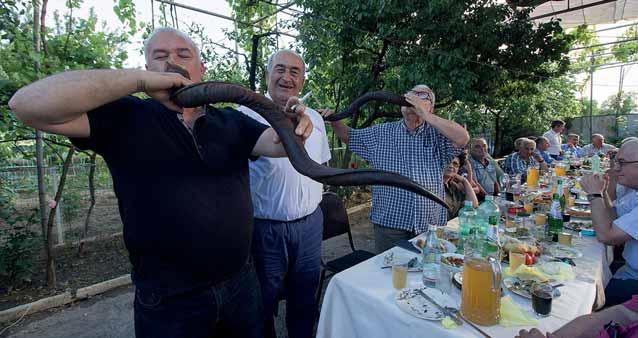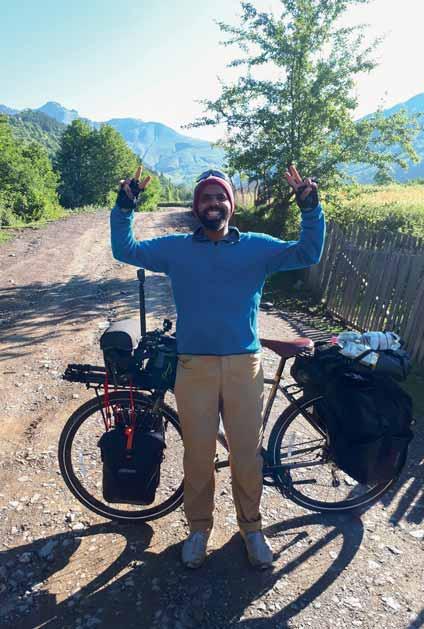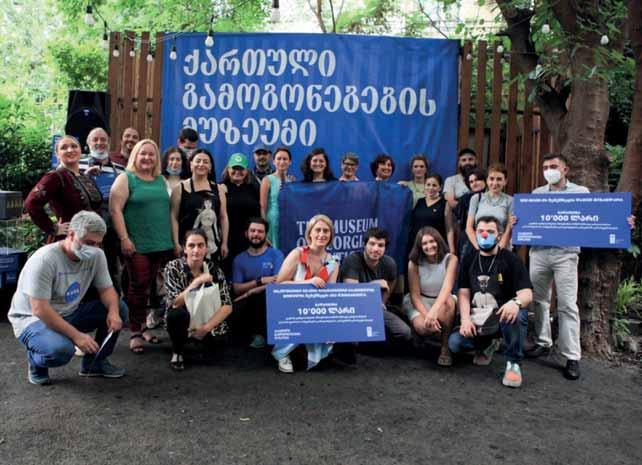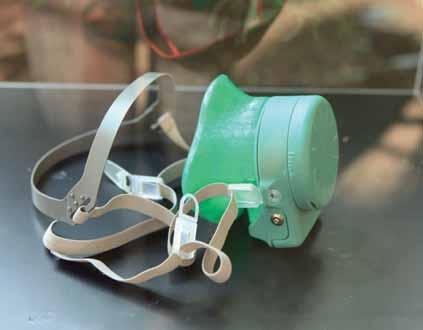
10 minute read
SOCIETY
from Issue #1305
What on Earth Makes Georgia so Attractive?
OP-ED BY NUGZAR B. RUHADZE
Advertisement
Frankly, this question doesn’t need to be answered by those who are already in love with Sakartvelo, either because they were born here or because they have learnt something good about it. This is the question asking for a response from an inquisitive, intelligent and sharp-eyed guest who likes Georgia, so I am ready to temporarily assume this unlikely role for myself.
Although the Russians have always been considered either colonizers or occupiers, they have also loved Georgia to death. They want to stay here for months and have fun ‘a la Géorgien.’ They have often stayed to reside here for good. I remember well that in the soviet era, the offi cials who were lucky enough to be directed by the government to Georgia on business were envied because Russians usually daydreamed of the Georgian hospitality, wine, food, and its beautiful climate and nature. They literally fought for a chance to fi nd themselves in this country for at least a couple of days. Georgia was like a younger brother who felt obligated to host the senior bro in the most festive manner, and the Russians took all that for granted. Unbelievable but true, one of the reasons the Russians are angry with Georgians is that they forfeited the historical chance to sprawl, bathe and relax in the comfortable lap of the Georgian nature where they used to feel totally at home, and this is very symptomatic – the Russians loved Georgia for a reason.
Let’s now take the Americans. They are no less amorous of Georgia than their perennial rivals here. Look at this geopolitical algorithm: Americans like Georgia and want to stay here, and Russians like Georgia and want to come back. Isn’t this wonderful? There can’t be a more peaceful and benefi cial rivalry.
Actually, the same kind of sentimental predilection towards Georgia on part of other nations is just as apparent. The Ukrainians, for instance, will never lose Georgians as benefactors, hosts and allies. They are simply rooting for Georgia at every presumable occasion. The kind of people the Georgians are and the sort of a land they dwell on, plus the relics of history and their lovely habit and skill to entertain the visitors, only serve to make this country terribly attractive.
On the other hand, a lot is left to be desired and done here. Tourism industry infrastructure like that of developed European countries would be helpful, and Georgia is trying as hard as it can to get to where its western family members are right now. The hope is that in this much accelerated time, things are happening quicker than they have in previous centuries and years. What mat-
A Georgian feast. Photo by Tony Hanmer ters most in this case is that Georgia has what one might call a gift of nature and history. What is left now is the wits and physical ability to hurry up and fi nish building the tourism infrastructure. Not much is left. And it is also true that what one can fi nd here in Georgia is practically impossible to discover in other spots of the Earth because the place is truly unique, a fact which needs to be better introduced to the rest of the world. The safety of travelling is also a very valuable thing on top of all that might attract a guest to this magical land. And another thing that one could say about Georgia without any reservations: most people who were born and grew up here have probably seen not more than one third of their own beautiful motherland. Isn’t it a shame? As such, they also count as potential tourists. After all, it is absolutely wonderful that so much is left in store for them to see and enjoy. They should even be glad that they have not yet tasted the rich fl avor of this beautiful country. It is quite imaginable how much fun awaits all those future guests who are soon to fall in love with Sakartvelo and stay that way for the rest of their lives.

Back on Tour: Etseri, Svaneti
BLOG BY TONY HANMER
It now seems safe to say that, here in Upper Svaneti, tourism is making a strong comeback after we said goodbye to the last of our winter guests in mid-March 2020, slipping away as Covid gripped the world. We do require proof of either recent full vaccinations or negative recent tests, but visitors are welcome.
We have re-opened our booking.com calendar, so that people can reserve a spot directly with us in advance. There are also all the other ways of fi nding us, none of which we have closed during the entire Virus crisis: a sign at the bottom of our road, the footer of my weekly Georgia Today article, 3 Facebook pages, TripAdvisor.com, Google Maps, maps. me, two guidebooks featuring Georgia, a local guidebook on Svaneti, and more.
There are also the unannounced dropins, and we have long learned to be ready for these. Seldom more than two people, they nonetheless require bedrooms and meals always to be ready just in case- these travelers can show up at almost any time.
Having seen off our 18 Poles, we have since hosted people from Belgium, France, Saudi Arabia, South Africa and the USA. The Americans were the parents and most of the siblings of a young man who has been with us six times, and whose marriage ceremony it will be my great honor and privilege to perform in a couple of weeks’ time near Tbilisi. While none of these guests was able to add to our guest book’s list of 64 languages, many of them wrote nonetheless, starting a new year for the guest house, for which we are glad. If the season continues in this vein, we will be most grateful.
Many of our travelers walk the road and footpaths which take them above us to Mazeri, the top of the village of Becho. It’s about a 7-hour trek, depending on how heavy your backpack is, rewarded from the halfway point onwards by glorious views of Mt. Ushba from its south peak (as long as the capricious weather is cooperating, that is). There is even a small lake just past halfway in which to shoot refl ections of the famous mountain, always a bonus for a photographer.
We can also connect our guests with other accommodation in different villages, Becho, Mestia and Ushguli particularly: people we know and trust to receive and look after them well. But sometimes there are just here for the utter peace and quiet which Etseri offers.
One thing which is brand new for us this summer is the inclusion of a village lady helper, whom I mentioned in previous writing. Now, several turns in, she is proving to be a huge benefi t in cooking and cleaning, someone worth her weight in Svan Salt and someone we really hope will be in it for the long run of mutual support.
The fl owers are coming out in turn; soon, when the elderfl owers appear, I will start picking them for both liqueur and cordial. Rose petals have already gone into moonshine and sugar syrup as well as being dried for tea. Mint tea straight from the garden is also a popular choice, especially for those who have never had it fresh before; some of them, particularly the children, delight in picking it themselves to see where it actually comes from. A quick wash and it’s straight into the cup, seconds out of the soil.
Other green herbs also add a lot to what we can offer locally and organically, as well as sulguni cheese from our neighbors. Local matsoni (yoghurt), my smoked cheese and dried smoked tomatoes, onions, garlic, lettuce, dill, parsley, beetroot, potatoes and more, later to be followed by sweet or sour plums, cherries the same, apples, pears, rosehips, elderberries, raspberries, blueberries, even the spring water which serves the whole village, and that from several mineral sources too… it doesn’t get much better than this.
We are glad to spread the table with all the goodness that our and nearby patches of ground bring, as it adds a thoroughly Svan touch to what Hanmer House provides. The tourism season has fully returned now, and after such a long hiatus, we are as ready as can be for you. We also hope that all other tourism and hospitality providers in the country are in the same situation, as it has been too long for us to be idle and equally long for travelers not to be on the move!
Tony Hanmer has lived in Georgia since 1999, in Svaneti since 2007, and been a weekly writer and photographer for GT since early 2011. He runs the “Svaneti Renaissance” Facebook group, now with nearly 2000 members, at www.facebook.com/ groups/SvanetiRenaissance/ He and his wife also run their own guest house in Etseri: www.facebook.com/hanmer.house.svaneti

Seeking Pandemic Solutions ‘by the People, for the People’: UNDP Accelerator Lab Announces its Solutions Safari Winners

Over 60 deeply engaged entrepreneurs submitted creative ideas to the United Nations Development Program (UNDP) Accelerator Lab’s ‘Solutions Safari’, a call for inventions that can ease the pandemic’s burden on citizens and businesses. The competition was funded by the governments of Germany and Qatar. Submissions included a dazzling array of simple and effective solutions that were created ‘by the people, for the people’ to address everyday challenges brought on by the pandemic.
The Accelerator Lab created the Museum of Georgian Inventions website and Facebook page to profi le participants and to promote the idea of people-driven solutions.
To fi nd the most standout proposal from among all submitted ideas, UNDP gathered an esteemed jury composed of Accelerator Lab members and representatives from the private sector, civil society and academic institutions. The jury chose two winners: Davit Mizandari and Anna Ghviniashvili. They will each will receive GEL 10,000 equivalent support to improve or upgrade their ideas and to put them into practice.
Davit Mizandari invented and patented the MizMask, a reusable and rechargeable respirator that creates a seal around the face to fi lter out harmful particles. MizMask is an N99 respirator that provides fi ve levels of protection (including an ultraviolet diode sterilizer). It will be particularly useful for frontline medical personnel, emergency crews and hospital staff who face an outbreak. A COVID19 hospital in Tbilisi has successfully tested a MizMask prototype.
Anna Ghviniashvili developed an online model for an inclusive dance class. Her class supports people with disabilities during the pandemic and helps them cope with the isolation, sense of loneliness and other psychological issues stemming from the pandemic. The online teaching methodology is based on fi ndings from Ghviniashvili’s research and her earlier practical experience teaching face-to-face inclusive dance classes. The Azdak inclusive theatre and the Youth for Social Equality organization are already using her model to great success; currently, over 70 people with disabilities participate in online dance classes thanks to Ghviniashvili’s innovation model.
“Business as usual does not work during a pandemic. We are experiencing extraordinary times that require innovative approaches,” said UNDP Acting Head Anna Chernyshova. “Our competition helps map out and support creative solutions to everyday challenges — solutions that come from people directly.”
“Smart use of innovative methods will help Georgia recover from the pandemic crisis,” said Head of Cooperation at the Embassy of Germany Lidija Christmann. “Germany is pleased to partner with UNDP to help unlock people’s potential to withstand the crisis.”
UNDP Accelerator Labs are now working in 116 countries. Each Accelerator Lab is focused on applying new insights and technologies to solve protracted development challenges. Georgia joined this fast-growing network of innovators and experimenters this year. Georgia’s Accelerator Lab initiatives are focused on supporting the National Centre for Disease Control and Public Health to overcome vaccine hesitancy in Georgia, transforming public attitudes towards recycling and waste separation and translating climate data into narratives to transform people’s behaviours.





